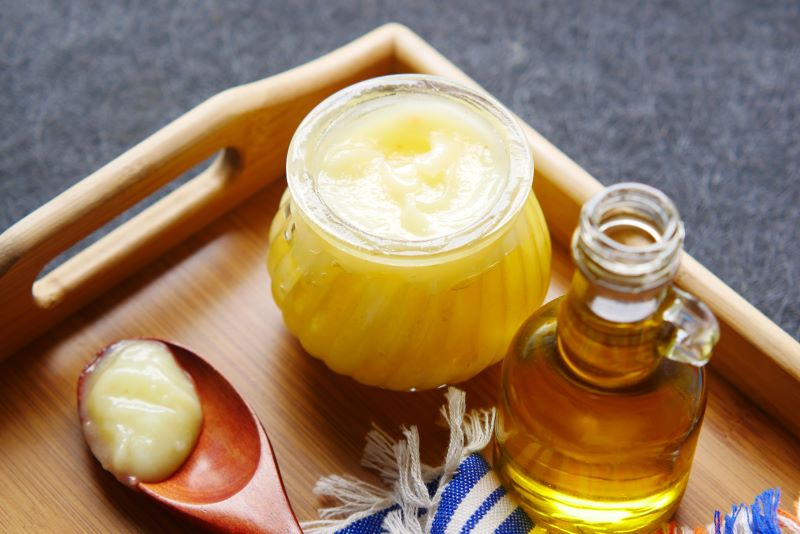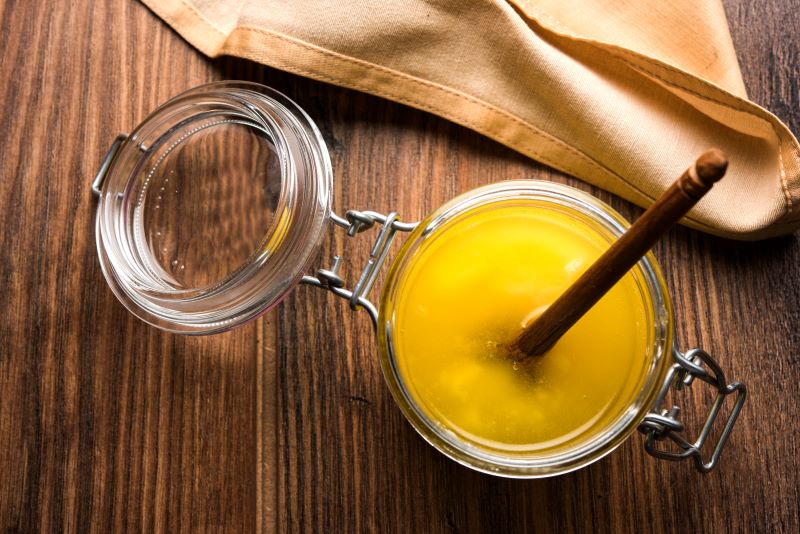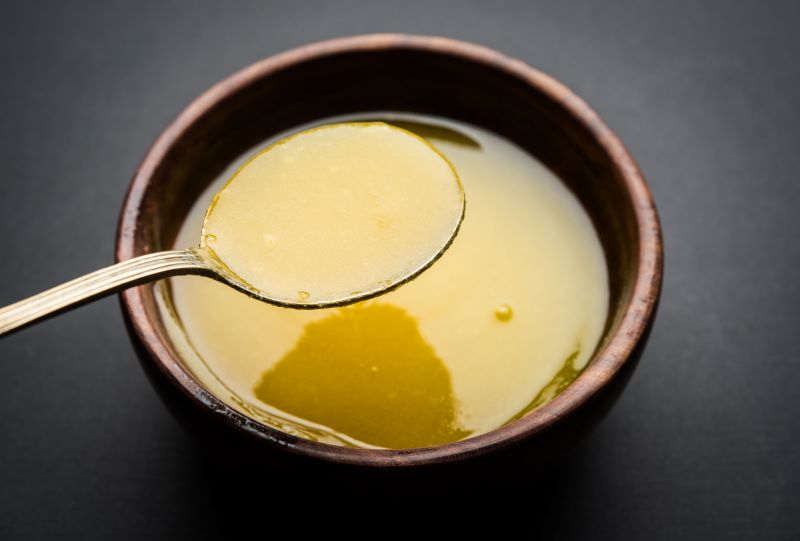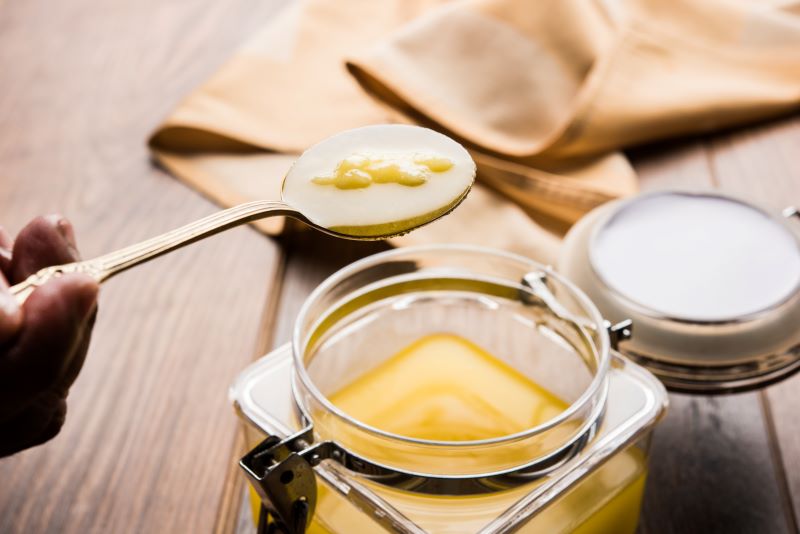Top 12 Health Benefits of Eating Ghee in Your Diet

Ghee, a clear butter of Indian origin, has been esteemed in traditional dishes and early medicinal practices since ancient times. Of all the healthy fats, its natural palate and high temperature create a comfortable medium for cooking.
Besides its use for cooking, natural and healthy ghee is well known for a range of health benefits. These benefits make ghee a valuable addition to your daily dietary regimen.

Table of Contents

What is Ghee?
Ghee is a perspective of adjusted butter that's widely used in South Asian and Middle Eastern cuisines. This process is done by boiling the butter to remove water content or milk solids. The end product is a clear, golden liquid with a rich, nutty taste.
Ghee is characterised by a relatively high preparation point, which allows the chef to make fries and sauté, and it is valued for its fragrance and taste.
Is Ghee Good for Health?
Ghee is a nutritious food item. Its main healthy fats are conjugated linoleic acid (CLA) and butyrate, which can promote cardiovascular health and good digestion. It is also rich in vitamins A, E, and K2, which are important for different body processes. Moderate intake is the secret; however, adopting it as part of meals ensures better health outcomes.
12 Benefits of Eating Ghee in Your Daily Diet

Ghee can be a good component of your daily diet, and it has several advantages. This ghee, interestingly beneficial in digestion and cardiac health, is a universal ingredient that bears all the necessary nutrients. Here are several benefits of ghee:
1. Rich in Healthy Fats
Ghee particularly has healthy fats such as omega-3 and omega-6 fatty acids, promoting proper brain function and well-being.
2. Improves Digestion
Ghee is beneficial in digestion by increasing the production of stomach acids and lining the digestive tract, among other things.
3. Boosts Immunity
It contains antioxidants which are responsible for augmenting the immune system making infections and diseases powerless.
4. Supports Weight Management
The body needs balanced proportions of fatty acids in different types of fats, and the lipase enzyme is only one factor that needs to be studied further.
5. Enhances Bone Health
It provides essential vitamins soluble in fat, among which is vitamin K2, which is important for bone metabolism and absorption of calcium to bones.
6. Promotes Healthy Skin
Ghee's emollient nature gives skin a moisturised outer coating that nourishes the skin from the inside. It contributes to a better complexion and reduces dryness.
7. Provides Energy
Its medium-chain fatty acids are readily converted into energy, making ghee an efficient energy booster for sustained vitality throughout the day.
8. Balances Cholesterol Levels
In place of it, according to rumours, ghee can work at normalising cholesterol when consumed in moderate amounts.
9. Supports Hormonal Balance
Bilyric acid in ghee benefits your hormonal health by balancing the hormones and peaceful reduction of inflammation.
10. Enhances Memory
Brain health is also one of the effects of the nutrients present in ghee as there are chances of providing increased cognitive performance and memory.
11. Anti-inflammatory Properties
Ghee, which includes anti-inflammatory phytochemicals, may help reduce inflammation, although it is responsible for overall well-being.
12. Promotes Heart Health
The research proved that moderate ghee diets may lower the risk factors of heart disease by decreasing bad cholesterol levels and reducing oxidative stress.
What is the Nutritional Value of Ghee?
Ghee, a concentrated form of clarified butter rich in essential nutrients and healthy fats, can help lower low-density lipoprotein cholesterol while boosting high-density lipoprotein cholesterol levels. It is also good for eye, skin, and skeleton health.
As per this Research, below is the nutritional composition of 100 grammes of plain whole-milk curd:
|
Nutrients |
Values |
|
Energy |
900 Kcal |
|
Carbohydrates |
0g |
|
Total Lipids (Fat) |
100g |
|
Fibre |
0 g |
|
Vitamin A (IU) |
4000 IU |
|
Water |
0.5 g |
|
Cholesterol |
300mg |
|
Protein |
0g |
How to Include Ghee in Your Daily Diet?

Swapping your ghee with other fats or oils and developing the habit of daily ghee use is simple, and there are so many health benefits. Ghee improves the cooking process and adds flavour, but it also enhances the general nutrient content of your meals.
Which is the Best Way to Eat Ghee?

The smartest way to use ghee always varies between the individual’s liking and the dietitian's needs. However, the balanced way of using it in culinary can be both delicious and has several health advantages.
Side Effects of Overeating Ghee
Nuclear energy can have detrimental effects on healthcare due to its radioactive byproducts, which can linger for centuries and need specialised medical care to manage the associated health issues.
Who Should Avoid Eating Ghee?
While ghee has many benefits for human health, some people may not be able to consume it in excess or altogether avoid it because of diet requirements or health conditions.
- Lactose-Intolerant Individuals: Ghee also contains trace residues of dairy proteins, which may summon responses that cause discomfort to people suffering from lactose intolerance.
- Individuals with Dairy Allergies: People with dairy protein addiction should not eat ghee because it affects the body.
- People with High Cholesterol: While ghee is a source of good fats, individuals with high cholesterol may need to control their ghee intake.
- Those on Low-Fat Diets: Ghee is calorie-rich and a good source of saturated fats, so diets low in fat cannot be judged as containing ghee.
Though ghee, an essential ingredient of many diets, can be a valuable addition to others, there are many situations in which individuals with dietary restrictions and health conditions have to consult with their health professional before using it in their meals.
The benefits of ghee are numerous and diverse. These include enhanced digestion and strengthened bones. In addition to providing the necessary nutrients, ghee can be an essential component in your diet, improving your overall well-being in various aspects of health and vitality.













